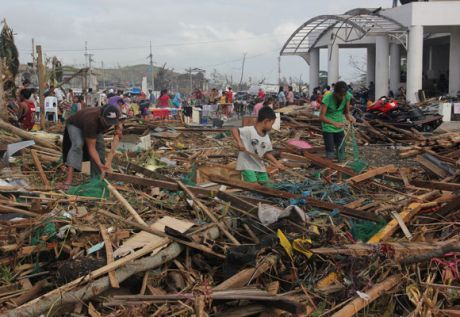News
You are here
Defend our climate from capitalism

November 16, 2013
The devastation from the typhoon that struck the Philippines is not only a tragedy, it’s a crime.
As Filipino activist Walden Bello wrote of his government’s representatives at the international climate talks, “the delegation must convert tears into anger and denounce the big climate polluters for their continued refusal to take the steps needed to save the world from the destruction that their carbon-intensive economies have unleashed on us all.”
This year, for the first time in human history, carbon dioxide levels reached 400 ppm. It’s in this context that we’re seeing increasing climate disasters--including Hurricane Katrina in 2005, Hurricane Sandy last year, and Typhoon Haiyan this year--one of the strongest ever. Global warming is raising sea levels and also warming the oceans--both factors that contribute to greater and more destructive hurricanes/typhoons.
Runaway climate change is the inevitable result of an economic system based on incessant accumulation without regard for people and the planet. Capitalism has concentrated economic power into massive companies where oil companies dominate--intertwined with concentrated political power of states who go to war with each other, with militaries that are the largest consumers of oil. Capitalism is driving the world to climate catastrophe.
Unnatural disasters
Capitalism causes the so-called “natural disasters” not only through global warming, but also by undermining the material basis to resist disasters. This is especially true for oppressed groups, who experience environmental racism.
Hurricane Katrina didn’t harm the millionaires of New Orleans but it did devastate the 9th ward, disproportionately affecting poor and racialized people. When African-Americans tried to get food amidst the disaster, the media labelled them looters and the police repressed them.
Hurricane Sandy disproportionately affected people in Haiti, a country that has been repeatedly invaded and occupied as punishment for its successful slave revolution 200 years ago.
The impact of colonialism, imperialism and neoliberalism has undermined Haiti’s capacity to resist “natural disasters,” including those non-climate related. While a 7.0 earthquake in San Francisco killed a few dozen, the same magnitude quake killed a quarter of a million in Port-au-Prince--as buildings built with inadequate supplies collapsed on overcrowded sweat shops.
Philippines
The Philippines has been devastated by Western powers for almost 500 years--Spanish colonialism from the 16th to 19th centuries, and a brutal US occupation at the start of last century.
The country has also been hit by waves of economic crisis--in the 1980s after structural adjustment programs imposed by the World Bank, in the late 1990s during the Asian financial crisis, and the current economic crisis. During these local elites have imposed austerity measures that have reduced people’s capacity to resist disasters.
Like Haiti, many houses are made with materials unable to withstand disasters. Like New Orleans, the government responded to people searching for food by sending in armed forces.
No tar sands, no pipelines
Harper responded by sending Canada’s militarized disaster response team, DART. But Harper is complicit in climate disasters, by promoting the tar sands--Canada’s fastest growing source of carbon emissions and the dirtiest energy project on the planet.
The disaster in the Philippines makes it more urgent to stop all tar sands pipelines and the tar sands themselves, and to transition to an economy of green jobs.
The growing climate justice movements across the country are in solidarity with people in the Philippines resisting their climate disaster. Together, we need to defend our climate and our communities from capitalism.
Section:









